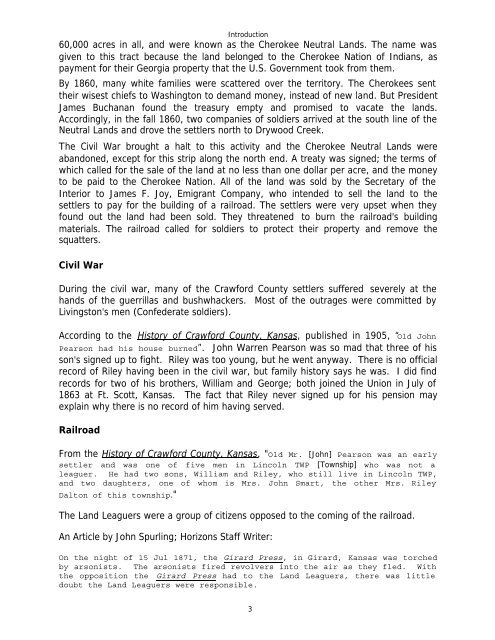A Brief Family History and Genealogy of Riley ... - TimPearson.com
A Brief Family History and Genealogy of Riley ... - TimPearson.com
A Brief Family History and Genealogy of Riley ... - TimPearson.com
Create successful ePaper yourself
Turn your PDF publications into a flip-book with our unique Google optimized e-Paper software.
Introduction<br />
60,000 acres in all, <strong>and</strong> were known as the Cherokee Neutral L<strong>and</strong>s. The name was<br />
given to this tract because the l<strong>and</strong> belonged to the Cherokee Nation <strong>of</strong> Indians, as<br />
payment for their Georgia property that the U.S. Government took from them.<br />
By 1860, many white families were scattered over the territory. The Cherokees sent<br />
their wisest chiefs to Washington to dem<strong>and</strong> money, instead <strong>of</strong> new l<strong>and</strong>. But President<br />
James Buchanan found the treasury empty <strong>and</strong> promised to vacate the l<strong>and</strong>s.<br />
Accordingly, in the fall 1860, two <strong>com</strong>panies <strong>of</strong> soldiers arrived at the south line <strong>of</strong> the<br />
Neutral L<strong>and</strong>s <strong>and</strong> drove the settlers north to Drywood Creek.<br />
The Civil War brought a halt to this activity <strong>and</strong> the Cherokee Neutral L<strong>and</strong>s were<br />
ab<strong>and</strong>oned, except for this strip along the north end. A treaty was signed; the terms <strong>of</strong><br />
which called for the sale <strong>of</strong> the l<strong>and</strong> at no less than one dollar per acre, <strong>and</strong> the money<br />
to be paid to the Cherokee Nation. All <strong>of</strong> the l<strong>and</strong> was sold by the Secretary <strong>of</strong> the<br />
Interior to James F. Joy, Emigrant Company, who intended to sell the l<strong>and</strong> to the<br />
settlers to pay for the building <strong>of</strong> a railroad. The settlers were very upset when they<br />
found out the l<strong>and</strong> had been sold. They threatened to burn the railroad's building<br />
materials. The railroad called for soldiers to protect their property <strong>and</strong> remove the<br />
squatters.<br />
Civil War<br />
During the civil war, many <strong>of</strong> the Crawford County settlers suffered severely at the<br />
h<strong>and</strong>s <strong>of</strong> the guerrillas <strong>and</strong> bushwhackers. Most <strong>of</strong> the outrages were <strong>com</strong>mitted by<br />
Livingston's men (Confederate soldiers).<br />
According to the <strong>History</strong> <strong>of</strong> Crawford County, Kansas, published in 1905, “Old John<br />
Pearson had his house burned”. John Warren Pearson was so mad that three <strong>of</strong> his<br />
son's signed up to fight. <strong>Riley</strong> was too young, but he went anyway. There is no <strong>of</strong>ficial<br />
record <strong>of</strong> <strong>Riley</strong> having been in the civil war, but family history says he was. I did find<br />
records for two <strong>of</strong> his brothers, William <strong>and</strong> George; both joined the Union in July <strong>of</strong><br />
1863 at Ft. Scott, Kansas. The fact that <strong>Riley</strong> never signed up for his pension may<br />
explain why there is no record <strong>of</strong> him having served.<br />
Railroad<br />
From the <strong>History</strong> <strong>of</strong> Crawford County, Kansas, "Old Mr. [John] Pearson was an early<br />
settler <strong>and</strong> was one <strong>of</strong> five men in Lincoln TWP [Township] who was not a<br />
leaguer. He had two sons, William <strong>and</strong> <strong>Riley</strong>, who still live in Lincoln TWP,<br />
<strong>and</strong> two daughters, one <strong>of</strong> whom is Mrs. John Smart, the other Mrs. <strong>Riley</strong><br />
Dalton <strong>of</strong> this township."<br />
The L<strong>and</strong> Leaguers were a group <strong>of</strong> citizens opposed to the <strong>com</strong>ing <strong>of</strong> the railroad.<br />
An Article by John Spurling; Horizons Staff Writer:<br />
On the night <strong>of</strong> 15 Jul 1871, the Girard Press, in Girard, Kansas was torched<br />
by arsonists. The arsonists fired revolvers into the air as they fled. With<br />
the opposition the Girard Press had to the L<strong>and</strong> Leaguers, there was little<br />
doubt the L<strong>and</strong> Leaguers were responsible.<br />
3


